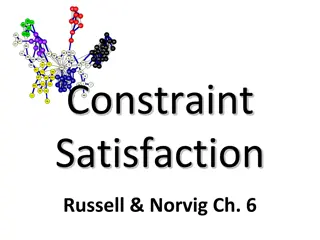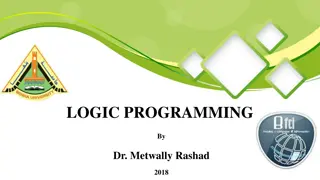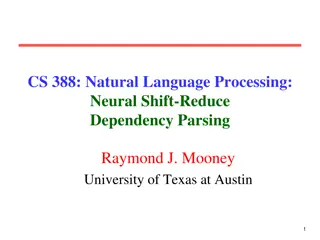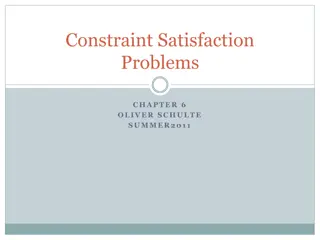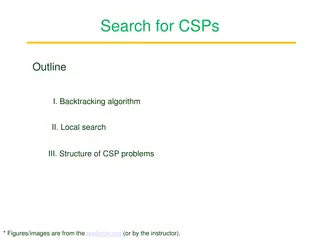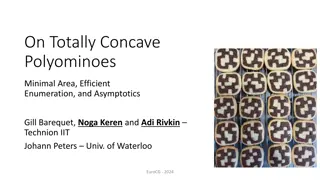Introduction to Constraint Satisfaction Problems
A Constraint Satisfaction Problem (CSP) involves assigning values to a set of variables while satisfying specific constraints. This problem-solving paradigm is utilized in constraint programming, logic programming, and CSP algorithms. Through methods like backtracking and constraint propagation, CSP
9 views • 78 slides
Understanding Logic Programming and AI Principles
This course focuses on logic programming principles applied to AI problems. Topics include Prolog programming, backtracking, recursive rule definition, built-in predicates, lists manipulation, and advanced techniques. Declarative languages like Prolog differ from procedural languages by describing p
1 views • 26 slides
Neural Shift-Reduce Dependency Parsing in Natural Language Processing
This content explores the concept of Shift-Reduce Dependency Parsing in the context of Natural Language Processing. It describes how a Shift-Reduce Parser incrementally builds a parse without backtracking, maintaining a buffer of input words and a stack of constructed constituents. The process invol
0 views • 34 slides
Comprehensive Course Overview on Algorithm Analysis and Design
Explore a detailed syllabus covering mathematical foundations, complexity calculations, asymptotic analysis, dynamic programming, traversal techniques, and more. Dive into key concepts like recursion, divide and conquer, greedy algorithms, backtracking, and approximation algorithms. Gain insights in
1 views • 11 slides
Understanding Constraint Satisfaction Problems in AI
Exploring Constraint Satisfaction Problems (CSPs) in AI involves topics like CSP definition, arc consistency, backtracking search, problem decomposition, local search, and more. A CSP is defined by variables and domains with a goal test formed by constraints. This field offers powerful algorithms wi
0 views • 66 slides
Overview of CSP Algorithms and Techniques
Explore the key concepts of Constraint Satisfaction Problems (CSPs) including backtracking search, local search, and the structure of CSP problems. Learn about important algorithms such as depth-limited search and heuristics like Minimum Remaining Values (MRV) and Degree Heuristics. Discover the com
1 views • 22 slides
Understanding Depth-First Search in State Space Exploration
Depth-First Search (DFS) is a search strategy employed in state space exploration, where the search algorithm delves deep into a single branch of the search tree before backtracking to explore alternative paths. DFS is efficient for deep search spaces but can get lost in blind alleys if not implemen
0 views • 19 slides
Solving NP-Complete Problems Using Backtracking and Branch-and-Bound
The journey through NP-Complete problems involves proving complexity, utilizing backtracking for intelligent exhaustive search, and adopting branch-and-bound for optimization. These techniques offer strategies to tackle intricate challenges efficiently, elevating your status as a problem solver with
0 views • 11 slides
Depth-First Search Exploration Techniques
Depth-First Search (DFS) is a graph traversal algorithm that explores all edges leaving a vertex before backtracking. It continues until all reachable vertices are discovered. This process involves classifying edges as tree, back, forward, or cross edges based on the relationship between vertices. D
0 views • 22 slides
Paper Mario Game Evaluation and Review by Chris Schram
Paper Mario is a 3D RPG game produced by Nintendo and made by Intelligent Systems. Players explore a 3D world, level up, gain partners, and abilities to save the seven star spirits, stop Bowser, and rescue Princess Peach. The combat is fun with simple yet logical action commands. The game features u
0 views • 9 slides
Efficient Enumeration and Minimal Area of Totally Concave Polyominoes
Researchers present findings on total concavity in polyominoes, exploring the minimal area, efficient enumeration methods, and asymptotic behaviors. Various bounds and algorithms are discussed, including a backtracking prototype and Jensen's algorithm for counting polyominoes without generating all
0 views • 22 slides
